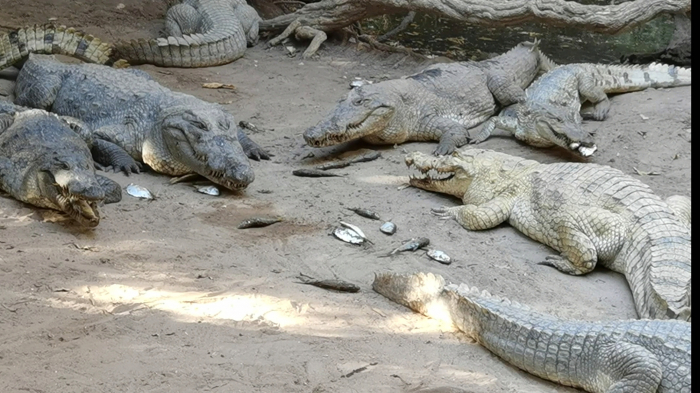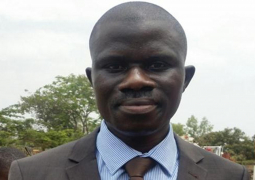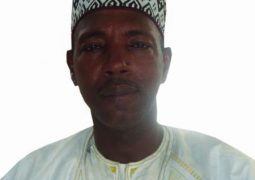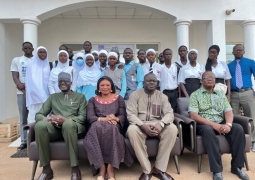
Up to 100 crocodiles of the Katchikally sacred pool in Bakau are undergoing hard nutrition times as impact of Covid 19 pandemic bites down tourism sector, depriving the pool of needed tourist incomes.
When Minister of Tourism Hamat NK Bah visited the acted site before the Covid pandemic, he held a meeting with the site manager Mr. Dodou Bojang. Their difficulties in maintaining the site as a tourist attraction were all laid bare.
However, to their surprise, when the Covid relief funds were administered by the Ministry of Tourism, no help came to them.
The site is nine-acre in size, located in the southern section of Bakau Old Town, 12 kilometers west of the Banjul. It is also habitat to some few cattle egrets that can be found on a circle of water lettuce besides the semi-aquatic reptiles.
It is reportedly more than 500 years old now, thanks to a strong bond shared with the Bojang Kunda community in Bakau. The pool employs 8 staffs, one died earlier last year.
With Covid 19 pandemic, the crocodiles sometimes go for a month sometimes without feeding. The operators used to maintain a book for tourists to donate to their feeding with any amount. These donations are collected to buy bonga fish from the sea.
Dante E, a visitor to the pool in a March 2020 review on tourism information site Trip Advisor, described the site as “a great place!”
“This is not a zoo, this is where the crocodiles choose to stay and live… we loved to see this natural place and pool and the crocodiles are very calm, looks peaceful! Count on about 2 hours to walk around! Bring some cash and give about 5-10€ in tip inside to the crocodile manager, the money is for fish to feed the crocodiles in the mornings! Well worth the time and that small amount of money!,” Dante E said.
After about nine months of the pandemic’s impact, those needed incomes are no longer coming. Hence the staff struggle to put food in their pool by themselves. The crocodiles now face dire need for food.
When our reporter visited the site last week after 5 p.m. on Thursday, it was feeding time. This has become rare for them.
A wheelbarrow full of bonga fishes were being used to feed about a dozen float (a group of crocodiles) at the pool. Since the morning, it took the workers hours of efforts to acquire fish from the suppliers at the sea thanks to fish scarcity.
“One day, a tourist guide came and found us in this situation without feeding the crocodiles for a week. He brought us a couple who now visit once a while to render their support,” said Site Supervisor Musa Bajo.
As we speak by the pool, a group of three young visitors were posing to take selfie photos and were called back to avoid getting too close to a female pregnant crocodile.
In order to control their population, crocodile eggs are usually collected by the staff and destroyed. This is necessary to maintain balance in the population of their population at the site. When this happens, the pregnant crocodile usually show signs of aggressiveness.
“We keep the population at 100 at most to maintain a balanced ecosystem. The financial means of supporting these crocodiles is not easy; to maintain a balance, we take into consideration their numbers and the space. However, killing of the crocodile is not permitted here as they are considered sacred,” Mr. Bajo explained.
Fighting for domination in the pool
For the past 25 years, Mr. Terema Ceesay has been in charge of feeding the crocodiles here, maintaining their environment and looking after other needs.
His relationship with the crocodile has become intimate. He knows their hideouts, their games and their special needs if any has one. He even gave some of them unique names, like Mama Touraynding (Kang Sutung) a 75-years-old crocodile exiled away from the pool.
In the float, one is always the king. When another potential leader emerges, they engage in a fight for domination. Mama Touraynding was defeated in such a fight. Hence she was exiled, but lives close by. sHe would gather her strength and return. Perhaps next fight, she would win and stay.
Led by the almost-67-year old Mr. Ceesay, with a bag full of bonga in his hand, we trekked about 80 metres in the bush to find Mama Touraynding. It is time she also gets fed as it was the second week without any food for her.
After trekking among trees and shrubs for about 80 metres, Mr. Ceesay topped and began calling out, “Touraynding! Tourayding! Touraynding! It is time to eat. Where are you?”
It was so quiet and peaceful in the bush, except for sound of birds. Then, slowly, branches began moving from a distance. Dry branches broke as the giant lizard-like amphibian approached us from its base in the stagnant water that became filthy and stenches badly.
Suddenly, she got blocked by group of bamboo trees that stood on her oath. “They do not see as they move. They are led by other senses like smell and sound,” Ceesay explained.
The almost-two-metre long amphibian crawled from behind the bushes, following directions as Mr. Ceesay instructs it to find a way by going to its right. And it complied.
When bunches of fish were thrown at it, Mama Touraynding grabs them by the side of its long mouth. It devours them one by one.
“When crocodiles go hungry, they become more aggressive and fight among themselves. They have never posed any threats to the people living around the neighbourhood here or the staff. Nonetheless, we remain sensitive and we take precautions,” Mr. Bajo explained.
Hundreds of millions for tourism sector
On Wednesday 30 September, 2020, the Minister of Tourism and Culture, announced the availability of a D100 million package.
According to the online newspaper, The Chronicle, Minister Bah, disclosed that although the funding has been secured long since but Tourism Ministry decided to engage an independent person to map out ways and means of “fairly disbursing the fund among all the actors within the sector.”
According to the Tourism minister, registered businesses and individual operators will benefit from the bailout package.
Hotels, restaurants, guesthouses, lodges, craftmarket vendors, tourists taxi drivers, juice pressers, nightclubs, casinos, equipment hirers, hairdressers, artists, gymnasiums facilities among host others will benefit from the package.
When a tourist Deborah M visited the site earlier in 2020, she was “shocked” to see a crocodile just lay in the park, unmoving with its mouth wide open.
“The only thing that moved was its eyes, it must surely be drugged to stay like this. I did have a photo taken with it,” she said on Trip Advisor.
The creatures are non-nesting. They are known to be very docile and some visitors are often seen stroking or touching them.
The Desert or West African Crocodile (Crocodylussuchus) are exclusively fed fish at least twice a week, which consists mostly of bonga fish brought in from the Bakau fish jetty.





